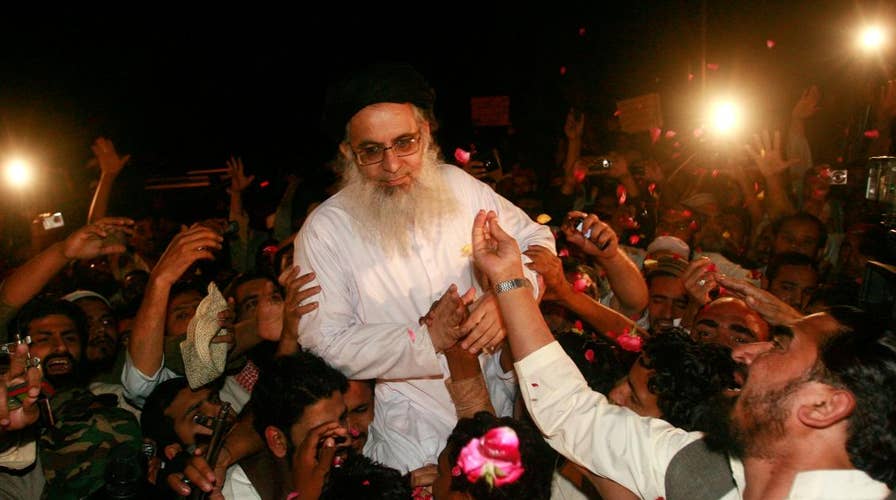Infamous Pakistani cleric keeps Bin Laden library, vows global Sharia
The infamous cleric, Maulana Mohammad Abdul Aziz, is considered one of the most dangerous men in Pakistan. He keeps a library to “martyr” Usama Bin Laden, vows worldwide Sharia and continues to influence thousands, including children.
Maulana Mohammad Abdul Aziz is considered one of the most dangerous, yet influential, men in Pakistan.
And while his movements in the country are restricted by the government, the 57-year-old former head cleric of Islamabad’s oldest mosque – Lal Masjid, better known as the Red Mosque – is still allowed to inspire new generations with his radical rhetoric.
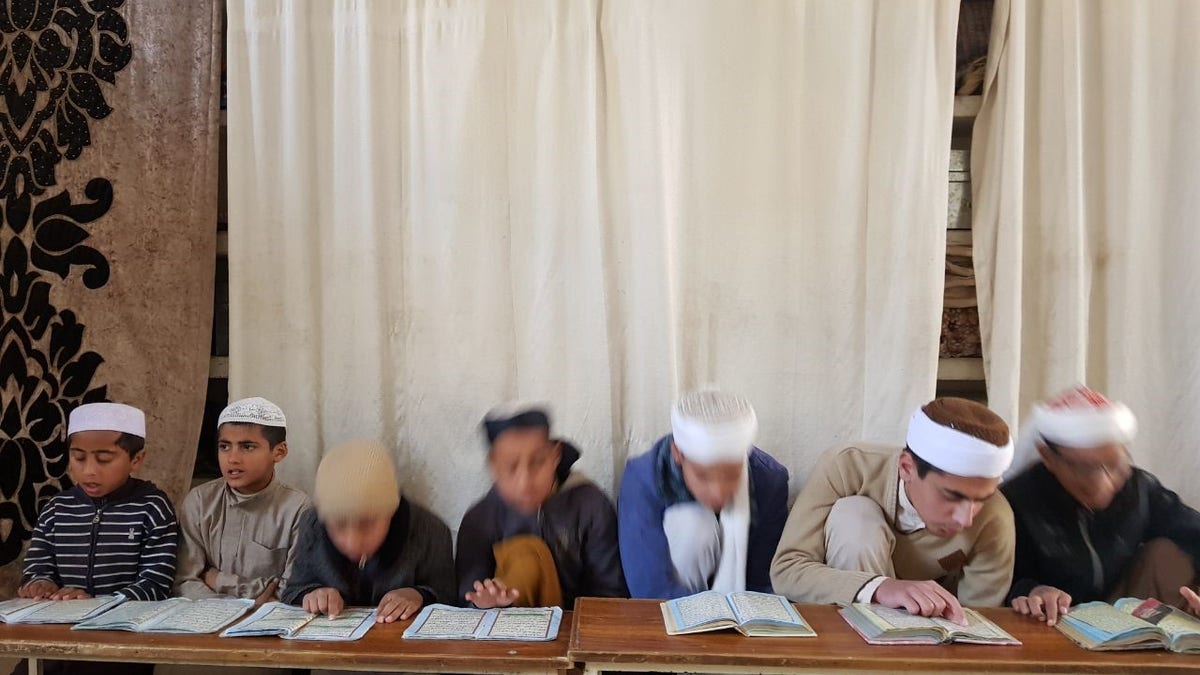
Students at Maulana Mohammad Abdul Aziz's seminary. (Fox News/Mohsin Saleem Ullah)
“We don’t see Pakistan anymore our destination, we will come out as a force to establish Islamic rule over the entire world,” Aziz told Fox News last week in a telephone interiew, from his Islamabad compound known as Jamia Hafsa, a seminary school that boasts around 1500 girls and 2000 boys. “You will see the change within 10 years - if you stay alive.”
In the government's endeavor to root out terrorism, Aziz is banned from the mosque – which technically belongs to the state. But he and his wife continue to oversee teachings just a few miles away.
“We want Sharia within our country and I, along with my pupils, will go to any extent to implement Sharia – even at the cost of waging a war against the country coerced government,” he declared.
Aziz has long been known for his inflammatory sermons, anti-American ideology, for sparking global jihadist movements and supporting designated terrorist groups. In 2014, he even named his school’s library the “Martyr Usama Bin Laden Library” in honor of the former Al Qaeda leader and 911 financier.
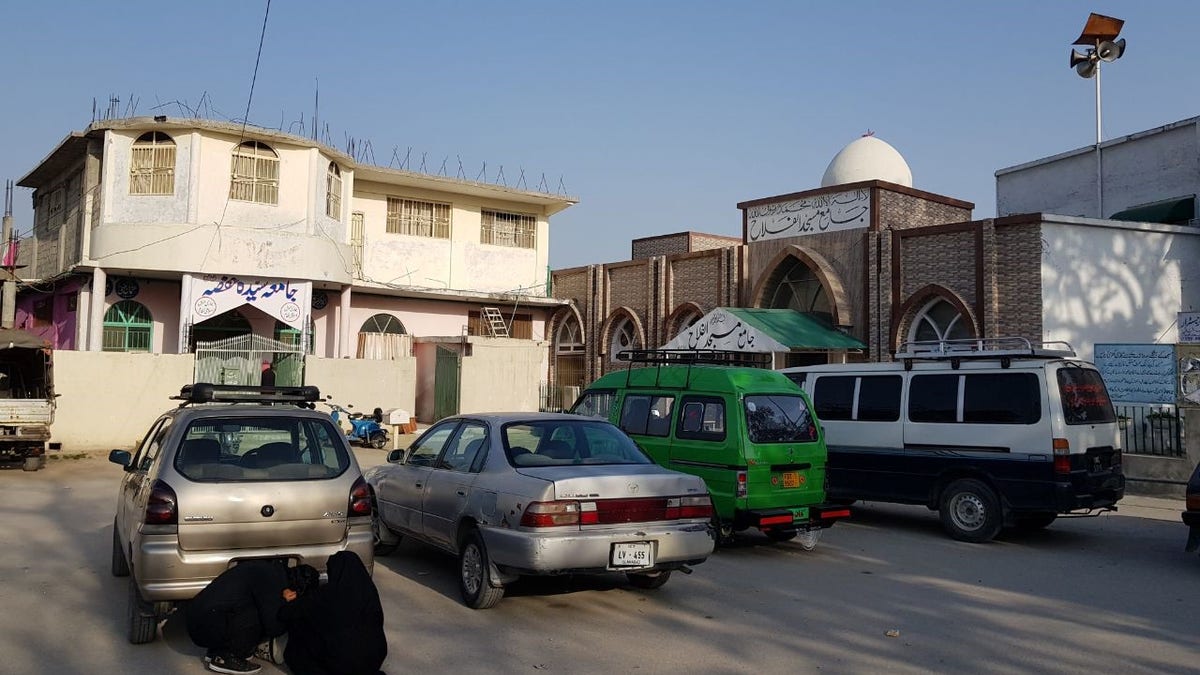
Outside Maulana Aziz's compound in Islamabad. (Fox News/Mohsin Saleem Ullah)
“Usama had good relations with my late father, thus we don’t support the American narrative, declaring him a terrorist,” Aziz said. “He did jihad, to implement Sharia around the world. So, for us he is an Islamist warrior. We title our library after his name with audacity.”
That chilling discourse may have hit close to the U.S. homeland more than once.
Soon after the 2015 San Bernardino massacre, in which female assailant and ISIS supporter Tashfeen Malik and her American husband, Syed Rizwan Farouk, slaughtered 14 of his co-workers, reports emerged that the Pakistani-born, Saudi Arabia-raised woman had been a Red Mosque student under Aziz.
“I never met with her,” Aziz claimed, before eventually acknowledging that they may have had an encounter as he has “many female followers.” But if so, she would have been fully veiled, he said. “The United States is failing attempts to establish my link with that shooting.”
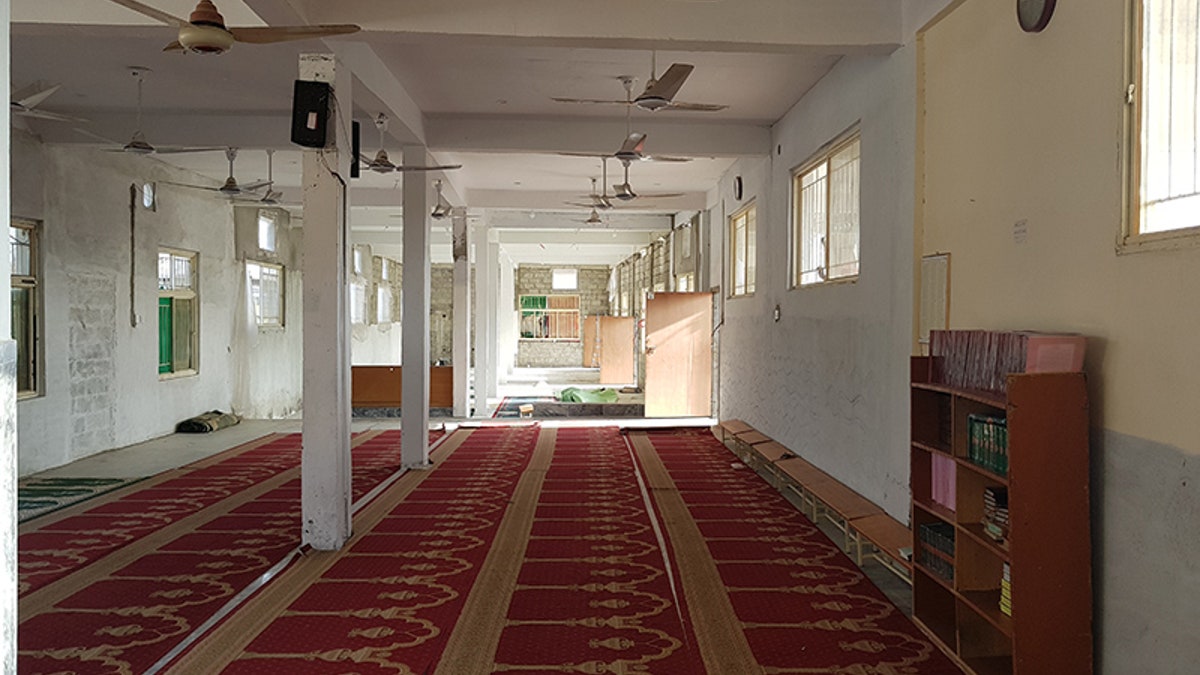
Inside Aziz's seminary. (Fox News/Mohsin Saleem Ullah)
But his links with violent movements are well documented.
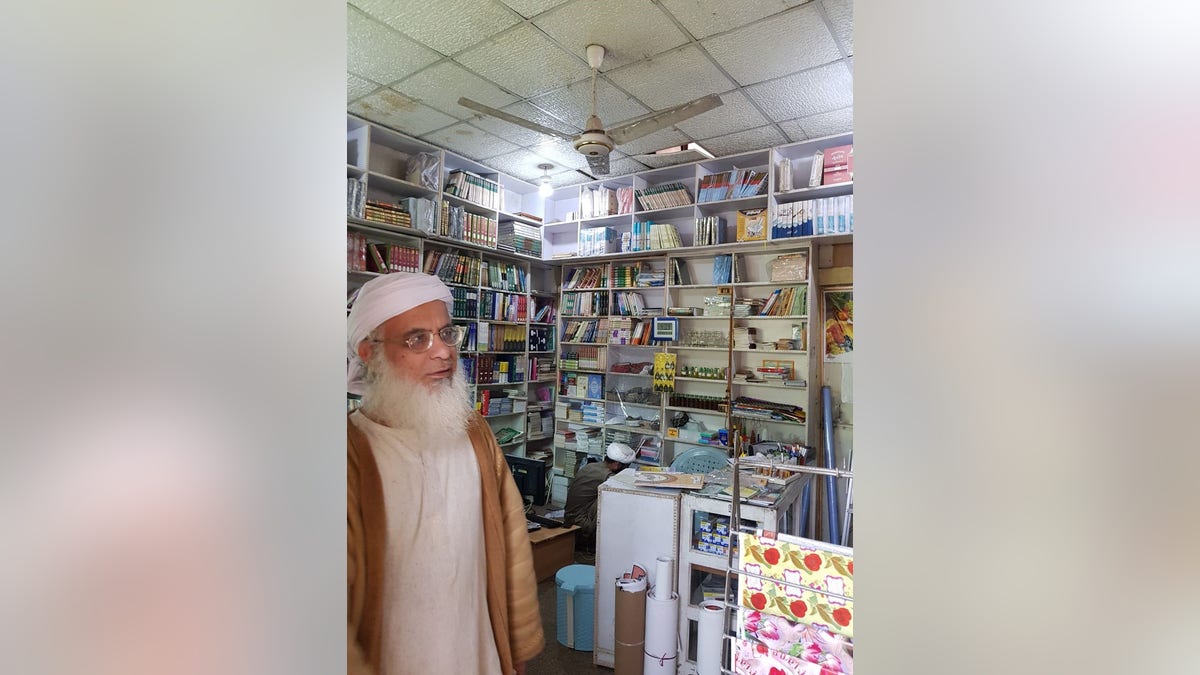
Controversial cleric Maulana Mohammad Abdul Aziz. (Fox News/Mohsin Saleem Ullah)
Under Aziz’s guidance at the Red Mosque in July 2007, scores of his baton-brandishing male and female students took to the streets outside. Video stores considered immoral were shuttered. Chinese women were abducted from a massage parlor they deemed to be a “brothel,” threats were made to throw acid in the face of female university students nearby, and a government ministry building was torched.
Tensions escalated between the militant mosque devotees and Pakistani Army into a bloody 10-day standoff that left over 100 people dead, including Aziz’s brother, mother and son. Aziz attempted to evade arrest by fleeing the chaotic scene disguised in a burka.
”I taught my students to stand against the corrupt system immobilizing the country.
Pakistan has inherited the British system, solely non-believers,” Aziz said of the incident. “I attempted to escape in a long veil with the consent of my martyred brother Abdul during the operation, and secondly, Islam supports this act to conceal oneself in a state of emergency.”
After several months in custody following the siege, Aziz was released, but deposed as cleric and barred from the Red Mosque, which his nephew, Amir Siddique, now leads instead. But the firebrand cleric promptly set about building a new facility, Jamia Hafsa, close by.
TRAPPED IN SYRIA'S BESIEGED GHOUTA: 'LIFE HAS CEASED, THE CHILDREN ARE WAITING TO DIE'
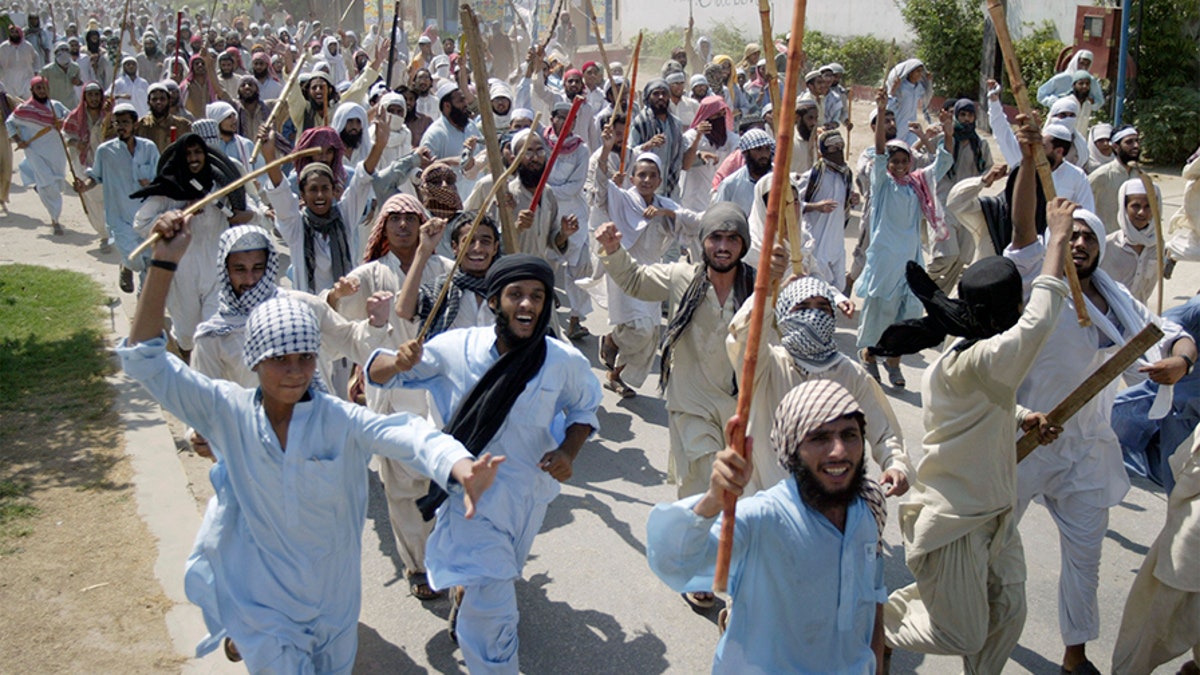
The Red Mosque in Islamabad was the site of a bloody 10-day siege. (REUTERS)
The Pakistani government has – particularly in the wake of the 2014 Peshawar school slaughter – purported to squash terror-inspiring voices like Aziz. And many Pakistanis have expressed their staunch opposition to the extremist preacher.
Those actions against him come at a cost.
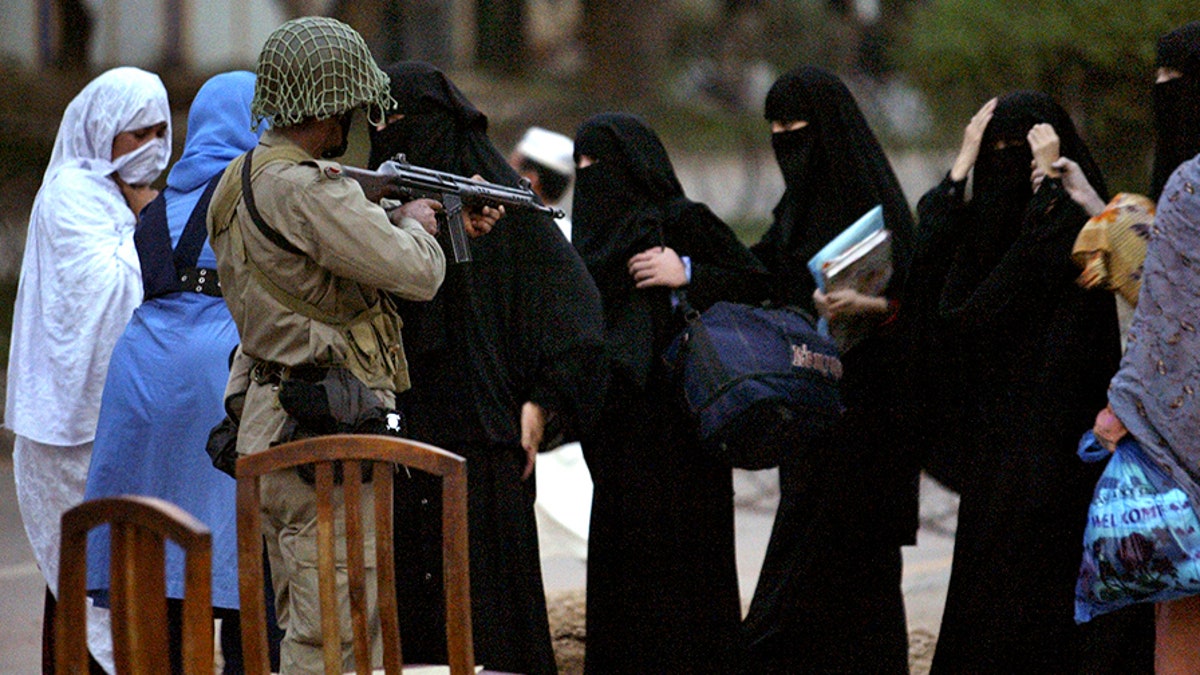
Baton-wielding female students took to the streets outside the Red Mosque in Islamabad, in July 2007. (REUTERS)
“Last time there was action against Mullah Aziz and his supporters at the Red Mosque, terrorism erupted in the northern parts of the country and eventually spread to other parts. So there remains a blowback in case of any severe action taken against him,” explained Farrukh Khan Pitafi, an Islamabad-based columnist and television journalist. “The past few years there has been a cultural shift in the country and Aziz has struggled to find space on the national media. But it remains a work in progress. It is safe to assume that he is down but not out.”
Jeff Smith, South Asia policy expert at the Heritage Foundation, pointed out further actions likely have not been taken against Aziz over concerns of retaliation.
SHIFTING ALLIANCES AS PAKISTAN MANAGES RELATIONSHIP WITH U.S.
“Aziz is highly critical of the Pakistani government but Islamabad knows he commands a sizable following and claim they have no legal grounds to arrest or convict him. Ultimately, they’ve decided it’s best to avoid stirring the hornet’s nest, even if means quietly allowing the swarm to proliferate,” he said.
“Ideally, Pakistan would pass legislation or criminal justice reforms outlawing the type of hate speech espoused by Aziz and his ilk, and then deal with them through the appropriate legal mechanisms.”
The Red Mosque did not respond for further comment regarding their current relationship with Aziz. But he asserted his ban comes as a result of “American and Indian influence” on Pakistan’s leadership.
“As a prayer leader in the Red Mosque, people are in support of me,” he insisted. “In the past, I have tried to enter but our frightened government called upon the Rangers to prevent me.”
Nonetheless, Aziz’s influence remains a cause for concern on an international scale. He denied being acquainted with any specific militant groups in war-ravaged Iraq and Syria, but said he “teaches a lot about jihad” to his many students who likely have gone “to join the noble in those countries.”
But in his view, Afghanistan is the most noble of all.
“At present, there is no Muslim country left in the world which has a Sharia ruler – neither Saudi Arabia nor Pakistan,” Aziz said. “I have found Afghanistan the only country in accordance with Sharia when the Taliban established its control over the land and I support those Taliban’s to-date.”
And according to Smith, Aziz still has significant influence.
“It is helpful to separate the ‘bad guys’ into two categories. There are those like the Haqqani Network that are actively and operationally involved in conducting terrorist targeting Afghanistan and U.S. personnel and interests there; and then there are those espousing violent extremist ideologies, sowing the seeds of hatred and religious fundamentalism across Pakistani society,” Smith added.
“Aziz very much falls into the latter camp and within the spectrum of radical Pakistani preachers remains a very prominent figure. While the first group poses the most immediate threat to the U.S. and Afghanistan, it’s arguably the latter group that’s doing the most long-term damage in the all-important war of ideas.”







































